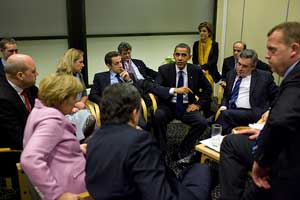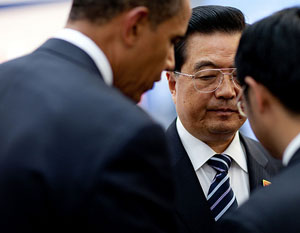Only a few days after the Copenhagen climate conference ended, the UN announced plans to overhaul its climate negotiations process. That’s because if the recent climate talks illustrated anything, it’s the extent to which the current treaty framework—an unwieldy process in which consensus among the 192 participating countries is near impossible—no longer serves its intended purpose of guiding nations toward meaningful, rigorous emissions reductions. “We will consider how to streamline the negotiations process,” said UN secretary general Ban Ki-moon on Monday. “We will also look at how to encompass the full context of climate change and development in the negotiations, both substantively and institutionally.”
The world has changed considerably—economically, ecologically, socially, etc., etc.—since the existing UN treaty process was set into motion after the 1992 Rio Earth Summit where countries drafted the UN Framework Convention on Climate Change, the international treaty that each subsequent Conference of the Parties, or COP, attempted to build on and improve. (Copenhagen was the 15th conference, hence the COP15 moniker.) But whereas the original UNFCCC treaty got away with carving the world into overly simplistic categories—essentially, a) industrialized countries, b) developed countries, and c) developing countries—the world has evolved considerably since then; across a country like India, where “development” is the decades-old rallying cry, you’ll find economies and societies industrialized, developed, and developing, all within one nation’s borders. Rigid categories like the UN’s, then, hardly capture the complexities of today’s global economy.
The plight of smaller, poorer countries is another matter crying out for change. Some, like the Group of 77, a bloc of impoverished countries, slammed the Copenhagen negotiations that they felt were dominated by wealthier nations. Tuvalu, a tiny, low-lying cluster of islands that could be an early climate-change casualty, was so fed up with the big nations’ bullying that one of its negotiators jammed up the talks and introduced a tougher, legally binding treaty of his own. A few other smaller countries kicked up a ruckus as well—but in the end, it was a short, vague agreement hatched by the world’s biggest countries that emerged from the arduous negotiations.
Perhaps, then, the best thing to come out of Copenhagen was clear evidence that the UN’s treaty process is outdated and needs fixing. Any new negotiations framework should better balance the needs of the developing world against the developed, and streamline the process so that, like Kyoto before Copenhagen, the fate of a far-reaching, crucial, monumental treaty—that is, if we ever get one—isn’t decided in the waning hours by a few world powers.












